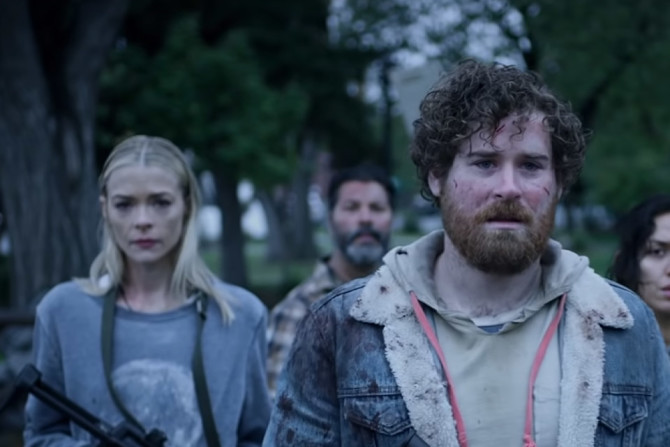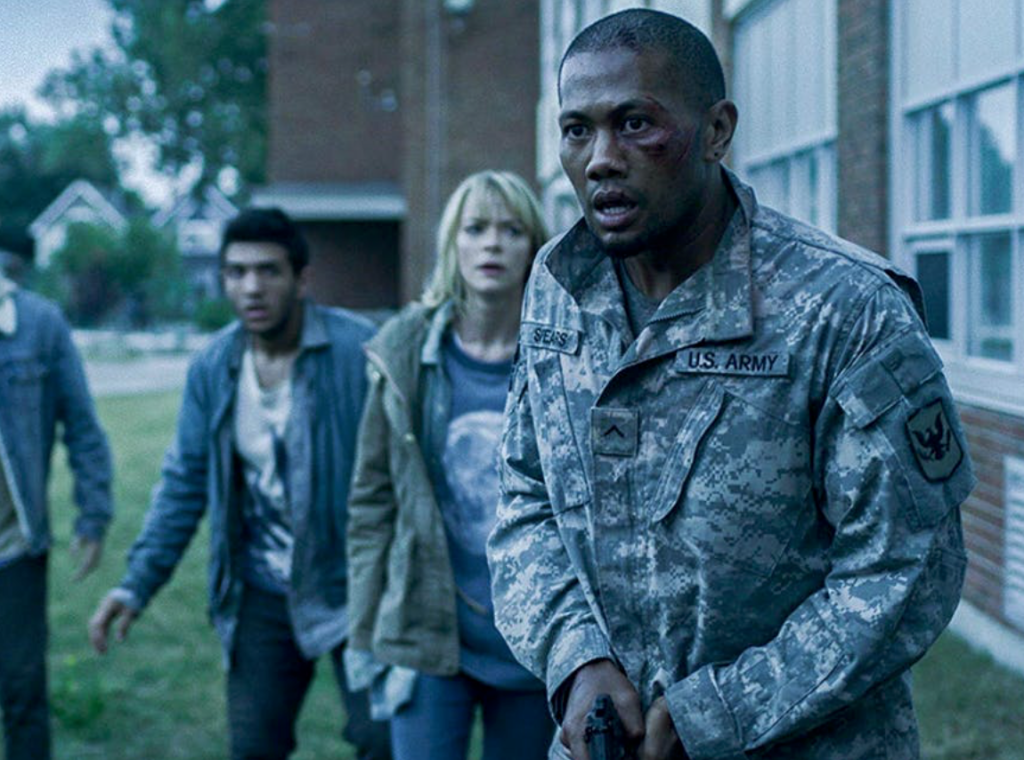Genre: TV – Zombie
Premise: A few weeks after a fierce zombie breakout, groups of people in a [previously] perfect suburban town come together to try and survive.
About: I’ve heard this is connected to the Z Nation zombie series? I don’t know anything about that show so I don’t know how closely the two are linked. But after a quick google search, this seems to be its own show trying to do its own things.
Creators: John Hyams, Karl Schaefer
Details: 8 Episode Series – Netflix
I kept going back and forth on whether I was going to review this show. But then last night I watched the best scene I’ve seen in a movie or TV show all year, and that put me over the top. I had to review it. I’ll get to what that scene was in a second, but first, let’s talk Black Summer.
In many ways, The Walking Dead has destroyed zombies. Not forever. They’ll come back again. But the show dominated the zombie narrative for over half a decade and, once the show went downhill, killed off any excitement for the 50 year old monster.
Naturally, for these reasons, I went into Black Summer skeptically. We’re going to be bouncing around with groups of characters holed up in temporary buildings while dealing with the occasional zombie attack? Umm, isn’t that called The Walking Dead?
But Black Summer makes a few key changes to the format. And while they may seem small individually, when you combine them together, they give us a show that definitely creates its own identity.
The show starts off with a tremendous opening scene. In it, we’re hovering over a quiet suburb in the middle of the day. We cut inside of a house to meet a father, mother, and daughter. They’re scrambling. Scared. The mother tells the daughter to hurry. They have to leave now.
We show them peeking out their door. The peek tells us something dangerous is out there, something predatory. Once they establish it’s safe to go, they start moving. And it’s here where we see everyone is coming out of their houses as well, all scared, all jogging. Jogging towards something. We don’t know what yet.
Finally, we see their destination. A military transport. They’re shuttling people out. However, the soldiers are checking everyone for something before they can get on. A disease? It’s hard to tell. Finally, a soldier exposes that our father character is injured. His gut is bleeding. The mom starts freaking out. Trying to explain that he’s okay. Meanwhile, the daughter has already passed through security. The squabble gets bigger. More people get involved. And now gunshots. And then the transports are leaving. The mother is screaming. She grabs her husband. They escape to a house. But it’s too late for him. He dies. And then he turns. And then she runs. Because if she doesn’t, she’ll be just like him.
That’s the beginning of Black Summer.
Eventually, the mother joins up with a group. A criminal masquerading as a soldier. A mute man. A cowardly hipster. And soon we learn what everyone’s so afraid of. Zombies. But these aren’t your moaning groaning Walking Dead zombies. These things are relentless. They’re sprinters. Can appear out of anywhere and be on top of you within seconds. You don’t get to line up the perfect headshot with these slow-pokes. You have to shoot frantically, never hitting your target where you want.
It was these two elements that got me hooked on the show.
Number one, Black Summer is not a series of scenes. It’s a series of STORIES. Each cut-scene is like its own mini-movie. We’ve talked about that before as a way to structure a screenplay, via eight miniature movies. And that’s the approach they take here. Each sequence has a title (“Drive,” “Nature Show,” “The Others,” “Follower.”). They’re not short, like your typical scene (2-3 minutes). They often go on for 5, 10, even 15 minutes.
They last longer because each sequence isn’t doing the typical boring TV show stuff like setting up characters and laying down exposition for later payoffs. Rather, they give you a story to watch. Things start building right away. There are already obstacles showing up. Even if you wanted to stop watching, you couldn’t. You have to find out what happens. And this goes on with each new sequence. It’s amazing.
Number two, the antagonists are actually dangerous. Don’t get me wrong. Traditional zombies can be scary. In fact, there’s nothing quite like a character stuck in a location where zombies are lumbering towards him/her from all sides. That slow impending realization that death is upon you is something no other horror monster can replicate. But the zombies in Black Summer are worthy adversaries for our heroes. If one spots you, even if they’re a block away, you better start running as fast as you can or you have no chance whatsoever. When your antagonists represent that level of fear, you’re going to have a lot of great scenes. And I say this as someone who reads a ton of horror and one of the main problems I run into is that the monsters aren’t scary enough. I don’t fear them. Go watch one zombie scene in Black Summer and tell me you’re not terrified of these things.
These two elements are what set us up for the scene I was referencing at the beginning of this post. It’s a 15 minute scene. It’s just two people. And there are four lines of dialogue in the entire scene. You can go watch it now if you have Netflix. It won’t spoil anything. Again, that’s the great thing about this show. It’s a series of short movies more than it is a continuing storyline. So lots of scenes can be enjoyed on their own. It’s Episode 4 (“Alone”) and it starts at the 19:45 second mark.
What’s so crazy about this scene working is that one defining rule I’ve always preached when it comes to chase scenes is that we have to care about the character in danger. We have to like them so that we root for their escape. Yet this character (Cowardly Hipster) was my least favorite character in the show. He was weak. He stayed in the background. He was a scaredy-cat. Not much to root for. But once this thing started chasing him, I’ve never wanted someone to escape as badly as I wanted him to. I think this goes to show how important it is to create a worthy antagonist – something that possesses a true essence of evil. If we’re scared enough of them, we will root for anything that’s pitted against them.
Another reason this scene works is the way that it’s shot. It’s basically one continuous shot. That makes us feel like we’re in the action. And, by proxy, that we’re the character. Maybe that was the filmmakers’ intention. It was never about making us care about this guy. He barely ever speaks in the show (that’s another cool thing about Black Summer – there is very little dialogue, it’s all minimalistic). Maybe it was about making him an avatar. We are him. We’re scared because if that zombie catches him, it’s us who dies.
I can’t say enough about this show. One final thought is that these directors asked the same question all us screenwriters should be asking when we write scripts. “How do I make this different?” Utilizing a mini-movie scene structure, relentless zombies, and long continuous shots that put us right in the action, Black Summer avoided that Walking Dead malaise. And in an age where that show gets more boring by the week, that’s a good thing.
[ ] What the hell did I just watch?
[ ] wasn’t for me
[ ] worth the stream
[x] impressive
[ ] genius
What I learned: It can be fun to delve into your mythology. You want to show your audience how deep you went to conceive of this universe. However, every story should be approached differently. While sometimes, explaining the mythology can heighten an experience (The Matrix), other times, it can burden it. What’s great about Black Summer is that we don’t know what’s going on. Neither do the characters. And it’s better that way because the unknown is always scarier than the known. Point being: Make sure that if you’re going to get into details of how your mythology works, it’s the right thing to do for the story. Black Summer proves sometimes the right thing is for the audience to know nothing.
What I learned 2: If you’re struggling with scene-writing, particularly with how to build tension in a scene, this is a great show to watch.



